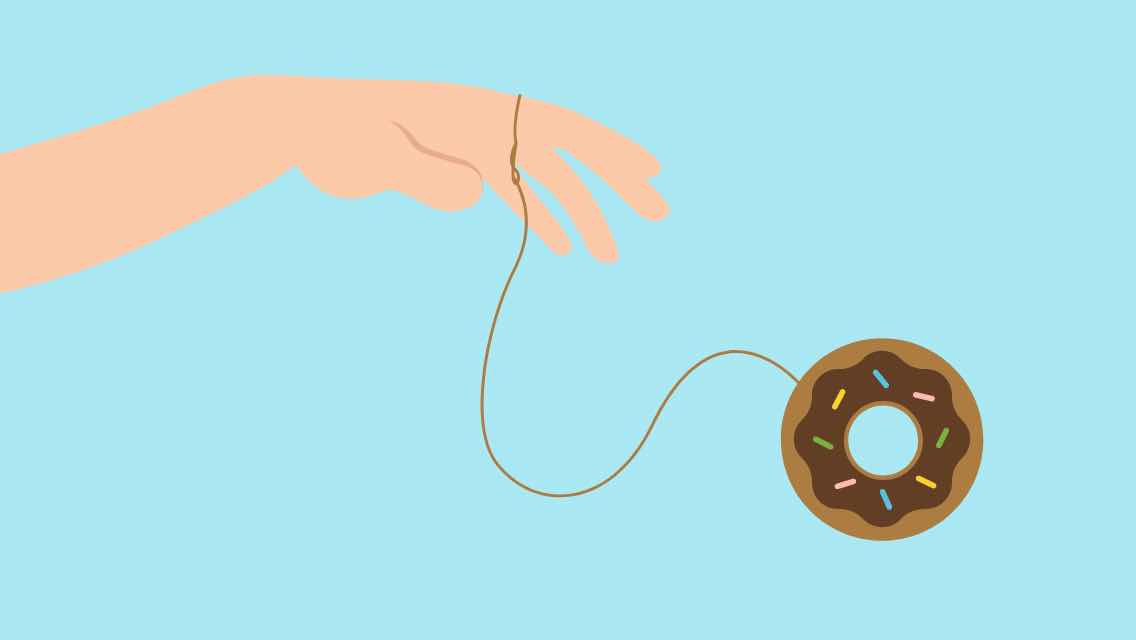At some point a couple decades into their marriage, Mike’s wife mentioned that she wanted to see less of him – about 20 pounds less. Mike, too, thought it would be a good idea for him to lose some weight, so he started a diet. Then he cheated on it. In fact, he cheated so frequently that he felt it was pointless to continue.
Like most of us who stray from our intended eating plans, Mike attributed his lack of staying power to hunger and cravings. Whenever his stomach felt the slightest bit empty, he’d start telling himself that he was “starving” and that he just couldn’t stand it.
Everyone who has tried to lose weight by dieting knows that the hunger triggered by calorie cutting is a major reason why diets don’t work. Then again, most diets don’t work in general, in part because they aren’t meant to be sustainable for the long haul, but also because the mentality they set up (“I have to be on this awful diet until I am thin”) is inherently destructive. But Joan Avis, Ph.D., psychologist and professor at the University of San Francisco, offers up some additional perspective. She believes that our inner dialogue, or “self-talk,” is often a major culprit in undermining our choices, and in derailing our relationship with food.
“Often,” she asserts, “it’s not just so much our hunger or the power of a particular craving, but what we think about it– and consequently what we tell ourselves about it – that keeps us from taking charge of our eating.”
Vicious Cycle
Avis believes that self-talk almost always precedes diet sabotage. When we feel hungry or deprived from dieting, she explains, we become anxious. The resulting inner dialogue – statements like “I hate dieting” and “I’ve got to have chocolate” – produces more anxiety and actually increases the likelihood of backsliding. Think of it as reciprocal causation: When we tell ourselves we can’t stand something, that statement is at once an expression of anxiety and a cause of anxiety. And when anxiety reaches a threshold, we crack.
One way to curb destructive food behaviors is to reduce disturbing emotions by eliminating negative self-talk. According to Martin Connelly, a psychotherapist in Portola Valley, Calif., eating-and-cheating patterns contribute to self-defeating thoughts such as “I’m fat” and “I have no self-control,” which in turn create and maintain even more anxiety. “Success requires challenging irrational and destructive thoughts and substituting optimistic strategies that sustain positive behavior,” explains Connelly.
Since our thoughts influence our feelings, by changing the nature of our self-dialogue, these experts suggest, we can effectively turn the tide of feelings in our favor using a three-step process:
Step 1: Be conscious of irrational self-talk.
Watch for exaggerations (“I’m starving”) and absolutistic language, like the words “must,” “can’t,” “always,” and “have to.”
Step 2: Check your internal dialogue for accuracy.
Is it really true that you’re dying of hunger, that you have to have some ice cream, that you must eat right this minute?
Step 3: Dispute your irrational beliefs.
Substitute dire proclamations and questionable justifications with the more accurate, rational statements.
(For more guidance on softening self-criticism and changing your internal dialogue for the better see, “6 Strategies to Improve Your Self-Talk” .)
Beyond Belief
In their book, The Art and Science of Rational Eating, Drs. Albert Ellis, Michael Abrams and Lidia Dengelegi apply the principles of Rational Emotive Behavior Therapy and Cognitive Behavior Therapy to personality disorders, binge-eating disorder, anorexia, and bulimia.
The book identifies a number of irrational beliefs about dieting, some of which commonly show up in the inner dialogues of dieters. Here are a few of them, as well as rational responses you can use to dispute your own defeating inner dialogues.
Irrational belief 1:
“I can’t stand being deprived.” This exaggeration implies that being deprived of the foods we love is physically or emotionally unbearable. While abstaining can certainly feel that way in certain moments, once we recognize that we are having an emotionally stressful, “deprived” reaction, we have the opportunity to choose a more conscious response.
Rational response: “I don’t like feeling deprived, but I can handle it. Besides, my choice to eat for health and to eat consciously is not an act of self-deprivation, it’s an act of self-care.”
Irrational belief 2:
“I shouldn’t have to diet and exercise.” This is a belief that things should be better than they actually are. In reality, if you’re overweight, it means that the conditions required for you to be overweight (taking in more calories than you expend) have been met. Thus, reversing that pattern is probably a good thing for you to be doing. Focusing on how “unfair” the situation is and obsessing about how things “should be” only distracts you from the reality at hand.
Rational response: “The extra weight I’m carrying is a reflection of how I am metabolizing the fuel I am taking in. If I want to lose weight, adjusting my eating and my exercise behaviors is important.”
Irrational belief 3:
“I’ve got to eat what’s being served to fully enjoy the gathering I’m attending.” There’s no reason why you’ve got to eat anything in particular to enjoy a special occasion. We can get enjoyment from meeting new people, catching up with friends or just taking in the scenery. And if we do choose to eat at an event, we can plan for it by adjusting our caloric intake and output during the day to offset the foods we’ll consume (in moderation) at the party.
Rational response: “I can enjoy myself here without eating everything offered or eating to excess.”
Irrational belief 4:
“One day won’t matter. Tomorrow I’ll start fresh.” The time it takes to get food from hand to mouth is sometimes all it takes to define whether we are living with integrity and health or with discrepancy and imbalance. Since, calorically speaking, one errant meal can ruin an entire week of progress, thinking in terms of next days and “fresh starts” is rarely helpful. Instead, agree to live in the moment, knowing that every decision, no matter how small, contributes to the continuum of your life experience.
Rational response: “Every moment is equal to every other moment. My choice – here and now – is what matters. There is no magical day when these choices will automatically become easy. Only I can make them easier by making them consciously, repeatedly, consistently – regardless of circumstance.”
Irrational belief 5:
“Its wrong that I have to work harder than other people to lose weight.” This is another way of saying, “I shouldn’t have to diet and exercise.” Remember, there is no evidence that anything should be different than it actually is, or that you should be different than you actually are. Right or wrong, this is reality. Some things come easier to you than others: Right now, this is an area of challenge – one that presents you with opportunities for self-discovery and progress.
Rational response: “Some people find maintaining an ideal weight easier than I do, and some don’t. I cant change that, and worrying over it only gets me upset. Right now, the best use of my energy is in taking care of myself.”
Irrational belief 6:
“I’ve got to have chocolate.” Oxygen? Yes. Chocolate (or potato chips or French fries)? No. Although food cravings do sometimes occur as physical reactions to a biochemical state (e.g., nutritional deficiencies, low blood sugar), more often they arise in response to an emotional situation. If you are experiencing real hunger or thirst, it makes sense for you to eat or drink something healthy. But if you are experiencing an emotional craving, no amount of chocolate will cure the problem – it will just provide a temporary anesthetic.
Rational response: “No one has ever starved to death for lack of chocolate. I enjoy chocolate, but I don’t have to eat it. Is there something pushing my emotional buttons right now? If so, what are my options for dealing with that? What if, for a change, I agree to simply feel my feelings and not do anything at all?”
Irrational belief 7:
“I can’t do it. It’s too hard.” Your body simply will not do something that your mind is convinced is impossible. If this is one of your mental scripts, know that its not that you can’t make good eating choices in a particular moment – it’s that you won’t. Remember, with enough calm attention and focus, you can always choose differently.
Rational response: “Changing my eating habits is a challenge, but I can do it – if I’m willing to stay present, emotionally and mentally. I may just need a moment to get calm, to remember my values and higher choices.”
Incorporating positive self-talk involves fairly straightforward techniques, but obviously, it is not always easy. So don’t beat yourself up, and don’t expect perfection – in your self-talk or your eating habits. Should you find that one of your own internal voices has gotten the better of you, take it as a learning opportunity. The goal is to develop a new pattern of conscious, positive dialogue, and part of that is noticing how and when you tend to get off course. Not confident of going it alone? A therapist or life coach can help. You might also develop a buddy system with a friend – ideally one who is trying to change food patterns of his or her own.
Agree to keep a list of key beliefs and responses by the phone and check in with each other both in times of weakness and success. Share your insights and strategies. Over time, you’ll probably notice you’re both hearing less negative self-talk – and “seeing a bit less” of yourselves.
This article has been updated. It originally appeared as “Language Barrier” in the March/April 2003 issue of Experience Life.





This Post Has 0 Comments